Based on the recommendations put forth by Safe Work Australia’s Decision Regulation Impact Statement, Australian governments, both state and territory, have unanimously agreed to ban the use, supply, and manufacture of engineered stone in Australia. This prohibition will officially begin on 1 July 2024 in most jurisdictions.
The reason behind the ban?
A severe health risk has been found concerning the inhalation of silica, which can happen when cutting, removing, installing, or working with manufactured stone. Silicosis is a lung disease associated with inhaling silica, and the rise of workers suffering from this ailment has led to the ban. With manufactured stone no longer an option, other building materials will need to fill the gap.
Stainless steel does not contain silica, making it a safe, sustainable option for your tradies and fabricators to work with. Long the building material of choice for commercial kitchens, stainless steel is hygienic, durable, and versatile, which is perfect for workbenches and benchtops. Let’s explore why manufactured stone is being prohibited and why stainless steel is the perfect replacement.
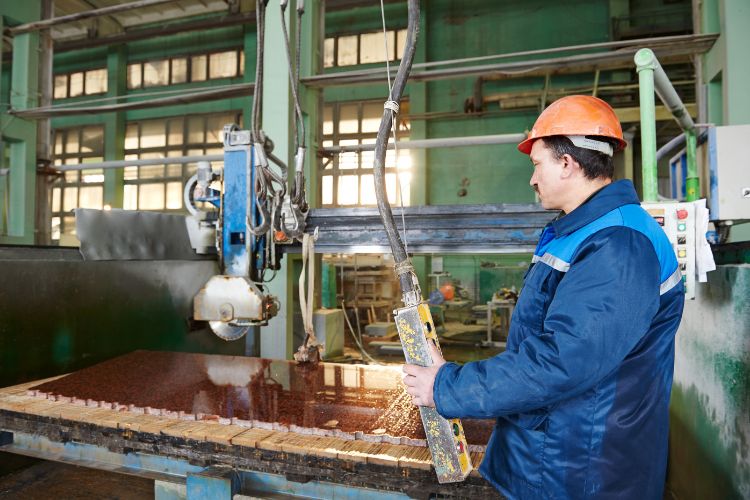
Silicosis: The Health Hazard Behind the Ban
The reason behind the decision to ban manufactured stone in Australia is due to the silica content and the severe risks this poses for manufacturers, contractors, and DIYers. Though manufactured stone is safe once installed, moving, repairing, cutting, modifying, or disposing of it can cause the release of silica dust. Silicosis is a lung disease caused by breathing in silica fibres and is a debilitating, irreversible condition. The high rate of silicosis among those who work with manufactured products is the key reason behind its prohibition.
What happens if you’ve already installed manufactured stone? Evidence suggests manufactured stone is perfectly safe once installed, so long as it isn’t disturbed. Current regulations are that engineered stone installed before the prohibition date can remain, receive repairs and minor modifications, and be disposed of. All of this must be performed by qualified professionals who will need to follow a national framework to ensure this work is performed safely. Even if you’re handy with the DIY, you should NOT attempt any repairs, modifications, or removals of manufactured stone yourself.
Due to the severe harm being caused to workers, the Australian Government has decided to follow the advice of health professionals and become the first country in the world to officially ban manufactured stone. Due to this ban, the need to find safer, alternative materials is crucial both for consumers and Australian trade.
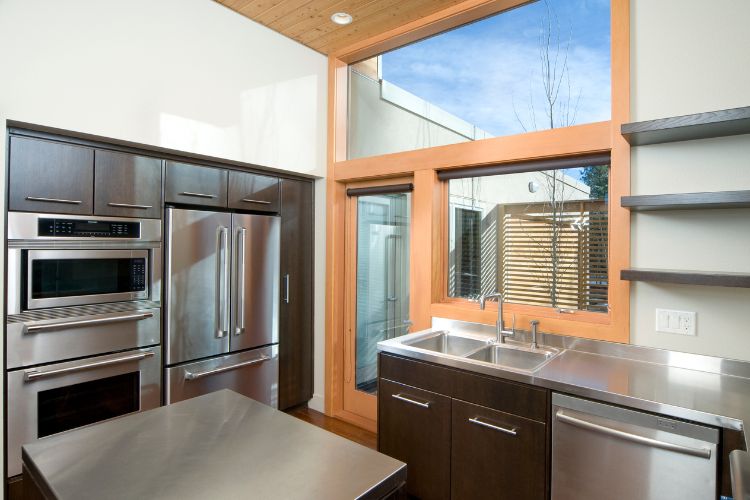
Stainless Steel: A Path to Sustainability and Safety
So, what makes stainless steel the ideal replacement for manufactured stone? Unlike manufactured stone, stainless stone offers no health hazards during manufacturing, fabrication, or installation and does not produce toxic emissions or silica dust. It is also a non-porous material, making it antibacterial and perfect for hygienic workplaces.
Stainless steel is also an eco-friendly option for several reasons. The first is that steel requires lower energy requirements during production, especially compared to other building materials. It’s also easy to recycle, and this recyclability greatly cuts down on stainless steel’s carbon footprint. Low maintenance requirements mean less harmful products are required to clean stainless steel. In fact, in most cases, a microfibre cloth and some detergent is all you’ll need.
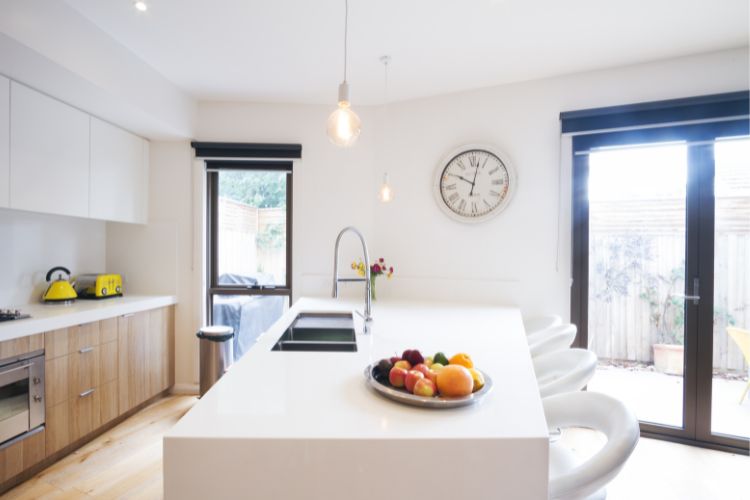
Comparing Materials: Stone vs. Stainless Steel
Longevity
Both stone and stainless steel are durable. However, there are some noticeable differences. When it comes to heat resistance, manufactured stone is vulnerable to higher heat and is vulnerable to fading from UV rays. It can also chip surprisingly easily and is more porous than people think, which can lead to water stains. Stainless steel is a durable and cost-effective building material that is highly resistant to heat and water and requires little maintenance.
Price
The key reason for manufactured stone’s popularity is that it allows homeowners to achieve the appearance of natural stone at a cheaper price (sometimes, but not always). With the new ban, other options that will fit into your budget while delivering in the long run will need to be considered. Whether comparing natural or manufactured stone to stainless steel, steel comes out as the more affordable option. This includes long-term costs, including upkeep and repair.
Aesthetic and Design Flexibility
Both stone and stainless steel have distinct looks, with stone being more natural while stainless steel is sleek and timeless. Stainless steel is also one of the most versatile materials when it comes to fabrication. A wide range of products can be created with stainless steel with more ease than they can be with stone. Entire commercial kitchens can be designed and constructed from stainless steel.
Hygiene
Workplace health is essential in any business. If you’ve ever worked in a commercial kitchen, laboratory, food preparation area, or medical facility, you’ll notice stainless steel is the material of choice in each. Along with durability, the hygienic nature of stainless steel is the key reason for this. In so many businesses, hygiene is essential, and stainless steel’s antibacterial properties and low maintenance needs make it ideal in these environments.
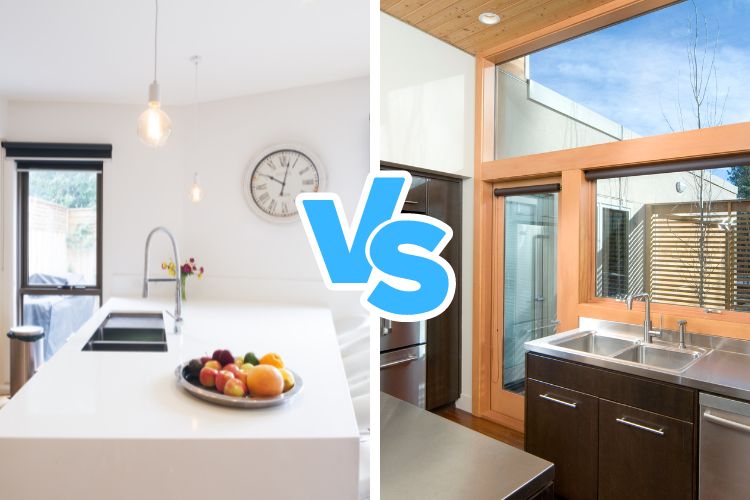
Pros and Cons: Stone vs. Stainless Steel
Stainless Steel Pros
- Highly resistant to heat, water, and stains, and doesn’t fade over time.
- Easy to clean and hygienic.
- A sleek and modern look that doesn’t go out of style.
- It is easy to customise, allowing for a range of products with a variety of features.
Stainless Steel Cons
- Can smudge and show fingerprints.
- Higher upfront cost than some materials.
- Can get scratched.
Stone Pros
- It has a classic, natural look, often considered luxurious.
- Very durable.
Stone Cons
- Manufactured stone has been banned; therefore, customers will need to purchase expensive natural stone.
- Natural stone requires more maintenance, including sealing.
- It is a very heavy material that requires extra support.
- It can be vulnerable to higher heat levels.
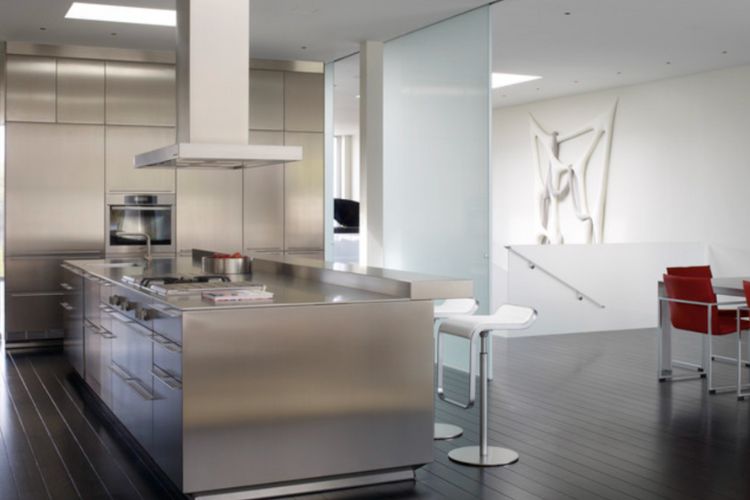
Image Credit: https://www.houzz.com.au
Economic and Practical Benefits of Stainless Steel
Stainless steel is a wise investment both initially and in the long term. An affordable material to purchase, fabricate, and install, well-maintained stainless steel products can easily last decades thanks to their toughness and anti-corrosion qualities.
Martin Stainless Steel has transformed a wide range of businesses, including restaurants, bars, pubs, food processing plants, and catering companies, to name a few. We stand by all our work and would be proud to help create the perfect layout for your business. For examples of our past work, click here to see some of our projects.
Stainless Steel: The Logical Choice
Stainless steel is the material of choice for so many industries because it finds the balance between affordability, functionality, and aesthetics. It’s a safe material to work with and is naturally antibacterial, making it perfect for kitchens, bars, and health facilities, among many others. The construction and trade industry are vital to the Aussie economy, and it’s important to choose building materials that are safe to work with and won’t harm tradespeople, staff, customers, or homeowners.
If you’re looking to learn more about stainless steel or want to discuss your next project, talk to the friendly expert team at Martin Stainless Steel. Contact us today to organise a free quote!
